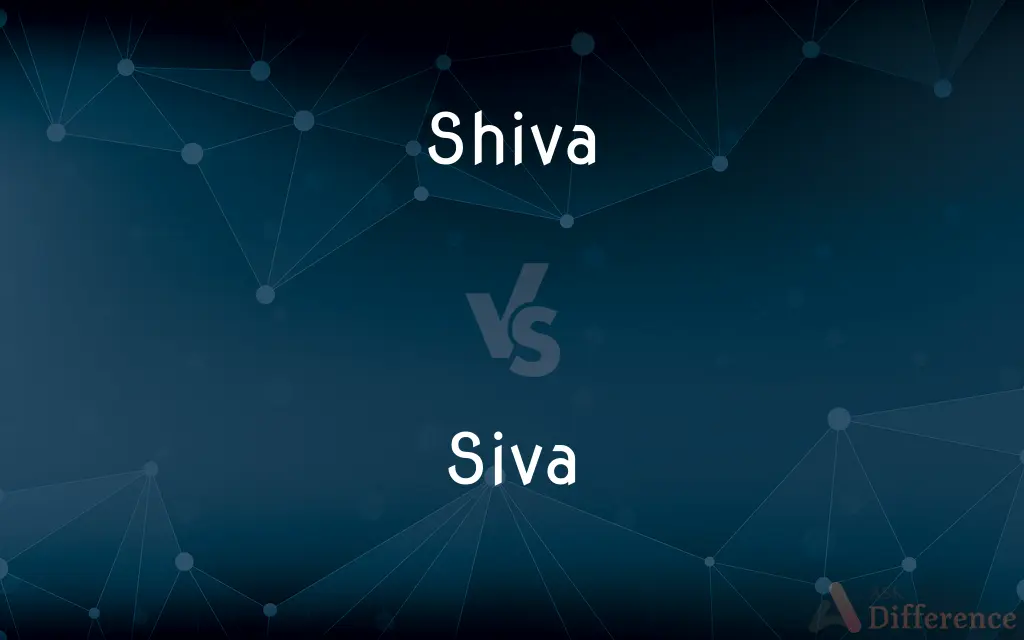Shiva vs. Siva — What's the Difference?
By Fiza Rafique & Urooj Arif — Updated on April 3, 2024
Shiva is a major deity in Hinduism, known as the destroyer and transformer, while Siva is an alternate spelling of Shiva, used interchangeably.

Difference Between Shiva and Siva
Table of Contents
ADVERTISEMENT
Key Differences
Shiva is one of the principal deities of Hinduism, representing the aspect of destruction and regeneration in the universe. Whereas Siva, merely an alternate spelling, reflects the same deity without any difference in religious or cultural significance.
The spelling "Shiva" is more commonly used in English and internationally, helping to standardize the deity's name in scholarly works, religious texts, and popular media. On the other hand, "Siva" might be preferred in certain linguistic or regional contexts, emphasizing a closer adherence to specific transliterations from Sanskrit, the ancient language of Hindu scriptures.
Both names denote a god with complex characteristics, embodying themes of destruction as well as benevolence, asceticism, and the cosmic dance of creation and dissolution. While "Shiva" might be more recognized globally, "Siva" maintains equal reverence and indicates no diminution in the deity's profound attributes and significance.
In depicting Shiva or Siva, imagery and symbols such as the trident, snake, drum, and the crescent moon play a crucial role, symbolizing his powers and qualities. These symbols are intrinsic to understanding Shiva's or Siva's role in Hindu cosmology, regardless of the spelling used.
The worship and veneration of Shiva or Siva involve rituals, festivals, and practices that highlight his role as a destroyer, a benevolent protector, and a source of wisdom and liberation. The choice between "Shiva" and "Siva" does not influence the devotional practices or the theological understanding of this deity's complex nature.
ADVERTISEMENT
Comparison Chart
Spelling Preference
More common in international use and English translations.
Preferred in certain linguistic or regional contexts.
Religious Significance
Major deity in Hinduism, symbolizing destruction and regeneration.
Identical to Shiva, with no difference in religious significance.
Symbolism
Associated with the trident, snake, drum, and crescent moon.
Same associations and symbols as Shiva.
Worship Practices
Involves rituals, festivals, and prayers dedicated to his aspects.
Identical practices and reverence as for Shiva.
Global Recognition
Recognized globally with this spelling in scholarly and popular contexts.
Recognized but may be less common in global discourse.
Compare with Definitions
Shiva
A major Hindu deity, symbolizing destruction and renewal.
Shiva is worshipped as the lord of dance and destruction.
Siva
An alternate spelling for Shiva, reflecting the same deity.
Siva is revered in Hinduism as a complex figure of worship.
Shiva
Represents the principle of destruction necessary for rebirth.
Shiva's destruction is seen as essential for cosmic regeneration.
Siva
Emphasizes a closer adherence to Sanskrit transliteration.
Siva's name is often used in traditional contexts and writings.
Shiva
Associated with symbols like the trident and the crescent moon.
The trident is a symbol of Shiva's power to destroy evil.
Siva
His role in Hindu mythology and cosmology is the same as Shiva's.
Siva's dance of destruction and creation is central to his worship.
Shiva
Known for his ascetic lifestyle and meditative practices.
Devotees often meditate to seek blessings from Shiva.
Siva
Carries the same symbolism and religious importance as Shiva.
Siva is also depicted with a trident, symbolizing his power.
Shiva
Worshipped through various rituals and festivals.
The festival of Maha Shivaratri is celebrated in honor of Shiva.
Siva
The worship and rituals dedicated to him are identical to Shiva's.
Devotees perform the same rituals to honor Siva during festivals.
Shiva
Shiva (; Sanskrit: शिव, lit. 'The Auspicious One' [ɕɪʋɐ] (listen), IAST: Śiva), also known as Mahadeva (; Sanskrit: महादेव:, lit. 'The Great God'), is one of the principal deities of Hinduism. He is the Supreme Being in Shaivism, one of the major traditions within Hinduism.Shiva has pre-Vedic tribal roots, and the figure of Shiva as we know him today is an amalgamation of various older non-Vedic and Vedic deities, including the Rigvedic storm god Rudra who may also have non-Vedic origins, into a single major deity.Shiva is known as "The Destroyer" within the Trimurti, the triple deity of supreme divinity that includes Brahma and Vishnu.
Siva
Variant of Shiva.
Shiva
One of the principal Hindu deities, worshiped as the destroyer and restorer of worlds and in numerous other forms. Shiva is often conceived as a member of the Trimurti, along with Brahma and Vishnu.
Siva
One of the triad of Hindoo gods. He is the avenger or destroyer, and in modern worship symbolizes the reproductive power of nature.
Shiva
A seven-day period of formal mourning observed after the funeral of a close relative.
Siva
The Destroyer; one of the three major divinities in the later Hindu pantheon
Shiva
(Judaism) A weeklong period of formal mourning for a close relative.
Shiva
(Judaism) a period of seven days of mourning after the death of close relative;
The family is sitting shiva
Shiva
The Destroyer; one of the three major divinities in the later Hindu pantheon
Common Curiosities
Is there any difference between Shiva and Siva?
The only difference is in spelling; they refer to the same deity in Hinduism.
Why are there two spellings for the same Hindu deity?
Variations in transliteration from Sanskrit to English account for the different spellings.
Does the worship of Shiva differ from that of Siva?
No, worship practices and religious significance remain the same regardless of spelling.
Which spelling is more correct, Shiva or Siva?
Both are correct; "Shiva" is more internationally recognized, while "Siva" might be preferred in certain contexts for its closeness to Sanskrit.
Can I use Shiva and Siva interchangeably?
Yes, since they refer to the same deity, the terms can be used interchangeably.
What is the significance of Shiva's/Siva's dance?
It represents the cosmic cycles of creation and destruction, symbolizing the dynamic universe.
Can non-Hindus worship Shiva/Siva?
Shiva/Siva's worship is open to anyone drawn to his qualities and teachings.
What are the main symbols associated with Shiva/Siva?
The trident, snake, drum, and crescent moon are key symbols of Shiva/Siva.
Why is Shiva/Siva important in Hinduism?
Shiva/Siva embodies the cycle of destruction and regeneration, crucial for maintaining cosmic balance.
Is the worship of Shiva/Siva confined to India?
While centered in India, Shiva/Siva's worship has spread globally through Hindu communities.
How is Shiva/Siva depicted in art and iconography?
He is often depicted as an ascetic god, with a trident, drum, and sometimes in a dance posture.
What festivals are dedicated to Shiva/Siva?
Maha Shivaratri is a major festival celebrating Shiva/Siva.
What lessons can be learned from Shiva/Siva?
Lessons of detachment, the importance of renewal, and the power of destruction for positive change.
How does one start worshipping Shiva/Siva?
Worship can begin with simple prayers, offerings, and meditation focusing on Shiva/Siva's qualities and stories.
Are there any sects specifically devoted to Shiva/Siva?
Yes, Shaivism is a major Hindu sect that worships Shiva/Siva as the supreme deity.
Share Your Discovery

Previous Comparison
Code vs. Regulation
Next Comparison
Clapboard vs. ShiplapAuthor Spotlight
Written by
Fiza RafiqueFiza Rafique is a skilled content writer at AskDifference.com, where she meticulously refines and enhances written pieces. Drawing from her vast editorial expertise, Fiza ensures clarity, accuracy, and precision in every article. Passionate about language, she continually seeks to elevate the quality of content for readers worldwide.
Co-written by
Urooj ArifUrooj is a skilled content writer at Ask Difference, known for her exceptional ability to simplify complex topics into engaging and informative content. With a passion for research and a flair for clear, concise writing, she consistently delivers articles that resonate with our diverse audience.
















































